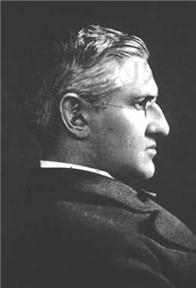Horatio Spafford

Horatio Gates Spafford (October 20, 1828,
Biography

Spafford was the son of Gazetteer author Horatio Gates Spafford and Elizabeth Clark Hewitt Spafford. On September 5, 1861, Spafford married Anna Larsen of Stavanger, Norway, in Chicago. Spafford was a lawyer and a senior partner in a large law firm.[3] The Spaffords were supporters and friends of evangelist Dwight L. Moody.[4]
Spafford invested in real estate north of Chicago in the spring of 1871. However, in October 1871, the
Two years after the Great Chicago Fire, the family planned a trip to Europe. Business demands (zoning issues arising from the conflagration) kept Spafford from joining his wife and four daughters on a family vacation in
Following the sinking of the Ville du Havre, Anna gave birth to three more children, Horatio Goertner (November 16, 1875), Bertha Hedges (March 24, 1878), and Grace (January 18, 1881).[4] On February 11, 1880, their son Horatio died of scarlet fever at the age of four. This final tragedy began Spafford's move away from material success toward a lifelong spiritual pilgrimage. The couple left the Presbyterian congregation and began to host prayer meetings in their home.[7] Their Messianic sect was dubbed "the Overcomers" by the American press.[8]
In August 1881, the Spaffords settled in Jerusalem as part of a group of 13 adults and three children, establishing the
In Jerusalem, Spafford and his wife adopted a teenager named Jacob Eliahu (1864–1932), born in Ramallah to a Turkish Jewish family. As a schoolboy, Jacob discovered the Siloam inscription.[10]
Spafford died of
It Is Well with My Soul

The original manuscript[12] has only four verses, but Spafford's daughter, Bertha Spafford Vester (author of Our Jerusalem: An American Family in the Holy City 1881-1949), who was born after the tragedy, said a verse was later added and the last line of the original song was modified.[13]
The tune, written by Philip Bliss, was named after the ship on which Spafford's daughters died, Ville du Havre.
When peace, like a river, attendeth my way,
When sorrows like sea billows roll;
Whatever my lot, Thou hast taught me to say,
It is well, it is well with my soul.
(Refrain:) It is well (it is well),
with my soul (with my soul),
It is well, it is well with my soul.
Though Satan should buffet, though trials should come,
Let this blest assurance control,
That Christ hath regarded my helpless estate,
And hath shed His own blood for my soul.
(Refrain)
My sin, oh the bliss of this glorious thought!
My sin, not in part but the whole,
Is nailed to His cross, and I bear it no more,
Praise the Lord, praise the Lord, O my soul!
(Refrain)
For me, be it Christ, be it Christ hence to live:
If Jordan above me shall roll,
No pain shall be mine, for in death as in life
Thou wilt whisper Thy peace to my soul.
(Refrain)
And Lord haste the day, when the faith shall be sight,
The clouds be rolled back as a scroll;
The trump shall resound, and the Lord shall descend,
Even so, it is well with my soul.
(Refrain)
Commemoration and legacy
At the
References
- ^ "Source of middle name and birth/death information".[permanent dead link]
- ^ "Family Tragedy - The American Colony in Jerusalem | Exhibitions - Library of Congress". www.loc.gov. January 12, 2005.
- ^ "Spafford, McDaid, & Wilson, Attorneys & Counselors at Law". The American Colony in Jerusalem. Library of Congress. Retrieved April 5, 2021.
- ^ a b c d Spafford, Horatio; Spafford, Anna; Ives, Currier & (January 12, 2005). "Family Tragedy - The American Colony in Jerusalem | Exhibitions - Library of Congress". www.loc.gov.
- ^ "Western Union telegram". Library of Congress. December 1, 1873. Retrieved April 5, 2021.
- ^ "Saved Alone | A Community in Jerusalem | Articles and Essays | American Colony in Jerusalem, 1870-2006 | Digital Collections | Library of Congress". Library of Congress.
- ISBN 978-0-297-85265-0
- ^ Smith, Wendy (December 14, 2008). "A Sect of Celibates". Washington Post.
- ^ Mission, Our. "How Strange Does the American Colony Story Get? Meet the Founders' adopted Jewish son, responsible for one of the most incredible archeological finds in Jerusalem in 130 years".
- ^ "Letter published in the Independent March 7, 1889, from Bishop John H. Vincent, of the M. E. Church "who lately visited the Holy Land."". Open Court Publishing Co. 7 March 1889.
- ^ "Photo of manuscript". Library of Congress.
- ISBN 0-405-10296-8.
- ^ Library of Congress Exhibition Overview. See also Yaakov Ariel & Ruth Kark. (1996, December). "Messianism, Holiness, Charisma, and Community: The American-Swedish Colony in Jerusalem, 1881-1933," Church History, 65(4), 641-657.
External links
![]() Media related to Horatio Spafford at Wikimedia Commons
Media related to Horatio Spafford at Wikimedia Commons
- SpaffordHymn.com : The original hymn manuscript penned by Horatio Spafford
- Cyber Hymnal : Archived 2011-07-03 at the Wayback Machine Photos of Horatio Spafford and a MIDI file of the hymn
- Elisabeth Elliot recalls tea with Horatio Spafford's daughter
- Gospelcom.net
- Christianity.ca : Many details on life of Spafford
- The Library of Congress Exhibition covering the start of The American Colony in Jerusalem, the Spafford Family tragedy, their move to Jerusalem, their time in the Holy Land, and the American Colony at work
- Works by or about Horatio Spafford at Internet Archive
- Works by Horatio Spafford at LibriVox (public domain audiobooks)

